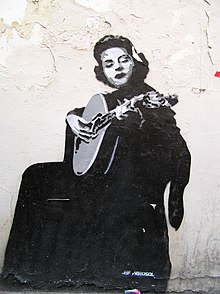by Gregory Walton-Green
After the Democratic party took over Portugal , they decorated Amália with the Official Degree of the Order of Prince Henry, the Navigator; the new government realised that Amália had put Portugal
Upon her death, from Amália’s house to the Basilica, people decorated their windowsills with white tablecloths, and the government placed her body in the Pantheon, among the other great Portuguese heroes.
 |
| 'The fado is not meant to be sung; it simply happens.' |
A rich, mournful voice echoes round my house: an old record, ‘The Art of Amália’ is playing. The voice imbues each note with an emotional intensity unlike any other artist. My mother has several of Amália’s albums, as well as other fado music: she gained her love of the uniquely Portuguese style from her own mother, who was born in Cidadelhe in the North of Portugal and was born with the same surname as Amália: ‘Rodrigues’.
I rarely delve deeply into my Portuguese heritage, but on the anniversary of Amália’s death, I look into the life of a woman regarded as “Portugal
 |
| Amalia Rodrigues (source: Wikimedia) |
9th October 1999: In Lisbon, Portugal, thousands weep and hold up white handkerchiefs in respect as a coffin, draped in the red and green of the Portuguese flag, is paraded through the streets. It is the state funeral at the end of three days of public mourning for Amália da Piedade Rodrigues, aged 79, who died in her sleep at her home in São Bento, Lisbon Portugal Portugal
 |
| (source: Walmartimages.com) |
Nobody would have guessed that the fifth child of a destitute cobbler from the impoverished Alcântara district of Lisbon would become such a great success. Amália developed a passion for singing early on in life: the people of Alcântara grew accustomed to hearing the little five-year old girl singing as she went through the streets of Lisbon Portugal republic of Portugal , reformed in 1910, usurped by Salazar’s draconian dictatorship in 1933, and that corrupt system itself overthrown by left-wing activists in the 1970s, to be replaced by Portugal
Despite Amália’s love of singing, her family’s poverty meant she needed to find a job at an early age, so she left school before her 14th birthday. She moved from job to job for several years, in order to help support her family as best as she could. Finally, in 1939, she started to sing and act professionally, at tavernas, ‘fado houses’, and theatres. She fell in with the other professional musicians in Lisbon Madrid , Rio de Janeiro , Los Angeles , London , Paris , Rome
Amália was now seen at most major Portuguese events: she was the entertainment for the bourgeoisie upper classes, providing enthralling music while greedy politicians had their corrupt dealings. On the other hand, she started to sing left-wing poetry, and sent money to support the communist cause.
 |
| Amalia Rodrigues (source: design4reel.com) |
She is a confusing mix of contradictions: impossible ever to analyse fully, fiercely proud of her heritage, choosing to wear the traditional Portuguese black shawl instead of the Spanish flamenco dresses Hollywood wanted her to perform in. She was devoted to the ‘fado’, the fatalistic music of Portugal France to Japan , yet in Portugal
 |
| Amalia Rodrigues' funeral procession (source: BBC) |
In her later years, Amália recorded fewer songs, but created many more compilations and published her own poetry. She gave generous support to the poor, trying to help others who grew up in circumstances like her own, and was a mentor to other 'fadistas' such as Dulce Pontes, who eventually took over most of Amália’s repertoire.
Since Amália, no other Portuguese has gained the same global recognition and adoration as her, and very possibly, they never will.
Comments
Post a Comment
Comments with names are more likely to be published.